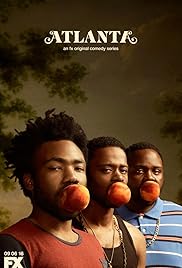Glover stars as Earn, a man who has recently returned to his hometown after dropping out of Princeton (for reasons that have yet to be explained and ensure Earn remains a bit of an enigma throughout the first season). He is fairly aimless, alternately crashing with his parents or Vanessa (Zazie Beetz), the mother of his child with whom he has a somewhat fluid relationship. Perpetually broke, he comes up with the idea to manage the fledgling rap career of his cousin, Paper Boi (Bryan Tyree Henry). Much of the initial comedy of the show ensues from the antics of Paper Boi and his right-hand man, Darius (Keith Stanfield). However, once the show hits its stride, it delivers a couple of standalone episodes that are on a whole other plane of storytelling genius.
The most talked about episode was probably the seventh one, "B.A.N." The premise is that Paper Boi is on a Tavis Smiley-esque serious talk show to discuss the portrayal of black culture and the treatment of the trans community, featuring a segment about a black man who is "transitioning" to white. There are also fake commercials, including a seemingly innocuous cereal advertisement that inexplicably (but hilariously/shockingly) devolves into a treatise on police brutality. It is a weird and wonderful episode, and while I'm still not clear what the takeaway was, it certainly was like nothing I had ever seen on TV. However, my favorite episode was "Value," where we get to spend twenty minutes with Vanessa. She had previously only been on the periphery of the show, existing solely in her capacity as Earn's baby mama, but now we finally learn more about this woman and get the perspective of a black woman in Atlanta after we've spent five episodes with the men. It is a remarkably incisive episode, touching on topics as varied as friendship, ambition, jealousy, and the Wodehousian ineptitude of public school bureaucracy.
In ten episodes, Atlanta has developed a very distinct style and flair. It's impossible to describe the show's tone - sure it could be called a comedy, dealing as it does with some very amusing supporting characters and shenanigans. But at the same time, it touches on issues of drugs, poverty, and gun violence, weaving them in so matter-of-factly into the day-to-day existence of these characters that you get weirdly inured to it, until you suddenly realize, "Wait, someone was just shot and killed, are we not going to talk about that?" That carefully casual tone speaks volumes, highlighting that being black in America often involves a resigned acceptance of the fact that you will see some awful things and just have to ignore them and keep on living your life. The final scene of Episode 10 serves as a wake-up call - we are so caught up in Earn's antics that it is a shock when real life intervenes and we are forced to acknowledge he isn't just living in a sitcom. It's thought-provoking television, and while it cannot speak for all black people everywhere, it is a critical addition to the rising chorus of black voices in pop culture.

No comments:
Post a Comment